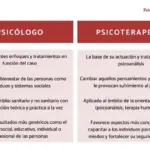
When someone completes their studies to begin practicing as a psychotherapist, it is common for the beginning of professional activity to be seen by the newly graduated as an overwhelming experience. This is also the case for those who are about to finish their studies and wish to dedicate themselves to the field of clinical psychology.
Although all psychotherapy must be based on a series of psychological constructs organized and articulated with each other, the reality is that work in the office has a practical component that cannot be discovered by taking refuge in books forever. There comes a point at which it is necessary to take a leap and meet face to face with patients or consultants. However, after taking that leap, a series of challenges often emerge that new psychotherapists (and more experienced ones as well) will have to face in relation to their work. In this article we will see what they are the main challenges of a psychotherapist in his clinical work and how to deal with them.
Choosing to practice as a psychotherapist
People who make the decision to practice as psychotherapists often agree on how rewarding this profession is. And it is a job that puts us in front of continuous learning opportunities, according to the lived experiences of each therapist and the particular stories of each person who enters and leaves through the door of the office – or, as it is each time most common, the video call. It gives us the possibility of experiencing high levels of satisfaction when we manage to see that a client improves, but at the same time it puts us in front of their pain, their suffering, and also ours.
People who consult do so because they have a problem and are looking for a change in that space they share with their therapists. It is, therefore, expected that difficult moments arise for a therapist when carrying out their work ; moments of conflict that were not originally present in that idyllic idea we had of the profession. Next, we will point out some of the challenges that a therapist must face.
1. Discrimination between personal and professional life
It is desirable that all people, whatever their trade or profession, have the ability to reserve some moments of the day exclusively for personal life. The fusion between professional and personal roles tends to be a source of suffering for people, especially in recent decades, since if we do not have time dedicated to spending time with the family and carrying out leisure and rest, we could live under the illusion that we are permanently working.
Psychotherapy allows a complementarity between both roles that few other professions have. This is not intrinsically a negative thing: working as psychotherapists encourages us to forge bonds with our clients who, although they are not friends, in them They are putting into play an emotional rainbow that can make us feel even more vulnerable than in our personal lives. That makes us very human.
The challenge for psychotherapists is not to close themselves off from their clients, but to know how to set a limit to how much they want to share. The same thing happens the other way around, when a person casually asks about the profession of another and the latter turns out to be a psychotherapist, it is important to define a “how far”, since many tend to ask for professional advice from a friend or psychologist acquaintance who, however, Due to the non-work quality of their relationship, they would not be able to provide them with the help they need.
2. Stay calm
Another challenge for psychotherapists is learning to remain calm in the face of certain situations that occur in session. Some clients may be hostile throughout the treatment ; or that they do so through an intervention. This can be annoying or even frustrating for the therapist. It could also happen that a person has some type of disorder or pathology that we do not know how to treat, or that we are not available to work with certain types of consultants. This is valid and referral is always possible, but above all, the key lies in maintaining peace of mind during stressful moments at work.
3. Learn from imperfection and failure
For some reason, when dealing with people’s mental suffering, psychotherapists fall into the idea that they should never make any kind of mistake. However, this thinking can be harmful to professionals. It is possible that we eventually perform an intervention at an inopportune time or in a way that was not appropriate ; Likewise, it could happen that we deviate from the most direct path to help our clients even though we have the desire to do so. Although we try to make it happen as little as possible, it is okay to make mistakes from time to time to allow ourselves to learn from new experiences. Like all people, we are doing the best we can.
4. Approach your own vulnerability
A psychotherapist is not a machine. Nor is it a tabula rasa, a blank page that is directly with the person, without thoughts or emotions. If anything, it’s more like a book: presents its own narrative, a story and a particular tone. The psychotherapist carries a personal baggage that he can hardly abandon completely before entering his workplace.
Sometimes, the clients’ stories resonate with the therapist’s own experience, due to some situation that they have experienced in the past or that is happening to them in the present. As we well know, being therapists does not exempt us from our human condition. For this reason, one of the challenges of the profession—perhaps one of the most significant—is learning to remain close to that vulnerability, to approach the intimacy of the consultants but also, inevitably, to one’s own, instead of shying away from it. she.
5. Address burnout
The burnout It is a challenge that all professionals must be attentive to, but mainly those who work in the health area or being in charge of people in situations of illness or emotional vulnerability. A therapist can go from caring for a person who has just lost a loved one to someone who is at serious risk, all separated by a gap of just ten minutes.
The professional may feel overstimulated, feel that he cannot cope with his role as responsible for guiding the therapeutic process, which may cause him to lose energy, motivation or direction; added to the problems that he can carry from his personal life. These aspects should be attended to by the professional and, if necessary, go to a psychotherapist himself. A book that brings to light the importance of going to therapy as a therapist is you should talk to someone by Lori Gottlieb, as it shows the difficulties a therapist experiences when bonding with her clients while going through her own divorce. This is recommended reading for all therapists and people interested in this topic.
Do you want to train in the theory and practice of psychotherapy?
If you are thinking about specializing in the field of psychological therapy, the Online Postgraduate in Integrative Psychotherapy from Instituto Mensalus is for you. This training program gives the possibility of learning with the help of a teaching team of very experienced psychotherapists who dedicate most of their time to caring for patients in the Mensalus facilities. In addition, upon completion you will obtain a University Degree from the Nebrija University.








